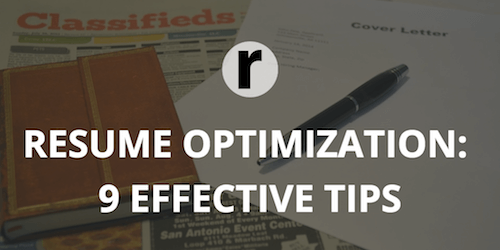
Creating an effective resume may take some time, but it’s nothing you can’t do. In most cases, it’s enough to get rid of unnecessary information, but you need to take note of a few important points. The Resumance.com team is here and will happily share them with you.
1. You resume should correspond to the current specialization you want to develop or improve on. For example, if you’re applying for a job in sales, it may not be necessary to focus on your experience as a systems administrator. It’s important to specify the scope of work from your previous position, if applicable.
2. The list of personal qualities and traits, like “punctual”, “responsible”, and “purposeful”, isn’t exactly the first thing an employer looks for in your resume. To begin with, they are to be expected of you. Instead of writing down basic and generic details, strengthen this part of your resume by adding personal achievements and/or projects you’ve accomplished as a professional.
3. The resume should reflect the position you’re applying for. If you can work as an administrator and a programmer, and you’re ready to take on tasks for any of these positions, try to compile two different documents.
4. Your resume should contain keywords and terms that are relevant or familiar to the job position you’re applying for. These are words or phrases that are commonly used in your field of work, such as “marketing”, “web programming”, “bookkeeping”, etc.
5. If you know more than one language, make sure to specify them in your resume. For example, you can mention that you have “good command of the English language” or that you “can speak basic German language but not intermediate”, or anything of the like. This way, you’re showing a potential employer that you’re capable of other tasks that may benefit the company, like standing as a translator for foreign clients or business partners.
6. Describe your professional achievements in numbered lists and facts. Include statistics, like the percentage on how you’ve managed to increase sales from a previous job. Also include the projects you’ve successfully completed. Such figures gives you the upper-hand from other candidates.
7. When dealing with a large number of CVs, an HR manager will most likely take a closer look at resumes that are well-structured and easy to read. With this in mind, make sure to divide information on your resume into semantic parts. Use lists if possible, and the summary must be concise yet informative.
8. Always check your CV for errors and inaccuracies - not just once but many times! Try to put yourself in the shoes of an HR manager. Is your resume logical and easy to read? Does it contain unnecessary information I need to get rid of? Does it represent you as a candidate who’s suitable for the vacancy?
9. When sending a resume directly to an employer, remember to not leave it in a file format that may require extra effort or a special software to view. As much as possible, keep your resume in DOC or PDF format.
As you can see, polishing up your resume is simple and easy, albeit it takes time and effort. But remember, you can always get help from the resume services and let them ease your burden.
Posted by Abigail Jackson
Abigail Jackson is the Editor-in-Chief at Resumance. After earning her degree in Psychology and working for several years as a career adviser, she is now working as an independent career consultant and a seasoned resume writer. You can get in touch with Abigail on Twitter @theresumance.


Comments